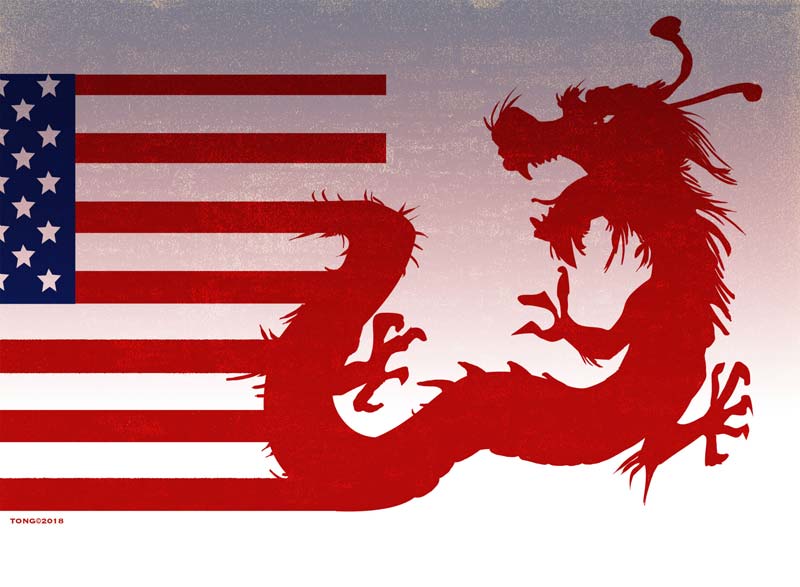
The president's tariffs are widely mocked but he has found Xi's weak spot.
Roughly 99.9% of economists regard President Donald Trump's trade war against China as idiotic. Doesn't he get that American consumers will pay the costs of the tariffs on Chinese imports in the form of higher prices? Doesn't he realise that a trade deficit is not equivalent to a loss in business?
When he studied at Wharton business school, Trump evidently missed the class on David Ricardo's theory of comparative advantage. But somewhere along the way he picked up an intuitive understanding of power.
A visit to Beijing last week revealed to me a governing elite scrambling to formulate a strategy for a trade war they thought would be over months ago, an economic elite divided about the consequences of the "Trump shock" and a middle class increasingly ambivalent about the government of President Xi Jinping.
China has few good options. It has imposed retaliatory tariffs, but it knows that Chinese imports of US goods are much less than US imports of Chinese goods. The idea of sending another delegation to Washington has been quietly abandoned. The former finance minister Lou Jiwei called for export restrictions on US companies such as Apple, but everyone I spoke to dismissed him as a "loose cannon". And no one thinks that a significant weakening of the Chinese currency would work.
Optimists in Beijing argue that the trade war has created an opportunity for the government to speed up economic reform. Pessimists admit that the US tariffs pose a significant threat. They worry that, far from accelerating reform, the trade war could lead to its postponement. China is supposed to be grappling with the mounting debts of its corporate sector, overcapacity in heavy industry and a financial system infested by shadow banks.
But to offset the effects of the trade war, China's rulers look like restarting their debt-propelled infrastructure investment machine.
The most striking feature of China today is the division at the top. As one hugely successful businessman put it to me, there are three Chinas: the "New New China" of the dynamic technology sector, the "New Old China" of the most profitable state-owned enterprises (SOEs), such as banks and telecoms, and the "Old Old China" of the heavy industrial, rust-belt SOEs.
There is growing pressure on New New China from the government, which regards the big tech companies as having grown so large as to pose a political threat. Jack Ma's recent announcement that he intends to step down as executive chairman of Alibaba (the Chinese Amazon) has been the subject of febrile speculation.
Rumour has it that Ma was told to step down with immediate effect but was able to negotiate a postponement. Cheng Li of the Brookings Institution argued in a recent article in the US magazine Foreign Affairs that the key to China's future was the attitude of its vast new middle class. I agree. The question is whether criticism of China's leadership — which has focused on the escalation of the trade war but relates to other issues, including Xi's abolition of term limits — will mutate into resentment of American bullying.
I wonder. My impression is that many educated Chinese people view the government's foreign policy with derision. The recent media coverage of Xi in the People's Daily has been comically old-fashioned, with innumerable boilerplate reports of his meetings with obscure heads of state, the majority from Africa. When, for a change, the front pages pictured Xi with Nicolas Maduro, the Venezuelan dictator, and Vladimir Putin. A popular meme on social media is a WeChat message contrasting China's history of conflict with Russia with its history of good relations with the United States.
There is much about Xi Jinping's China that brings to mind the French Second Empire, proclaimed in Paris 166 years ago. The emperor, Napoleon III, was a modernising autocrat, a living advertisement for the benefits of strong leadership over democracy.
Like Xi, Napoleon III pursued a free trade policy, exemplified by the 1860 Cobden-Chevalier trade treaty with the UK. Like Xi, he was a bold urban planner. During his reign Paris was transformed into the spacious city we know today, just as Beijing is being shorn of its migrant workers' slums.
As in China today, the bourgeoisie in Second Empire France was, on the whole, content with its lot as long as the good times rolled. There was a railway construction boom. The department stores of Paris, such as Le Bon Marché, were a sensation. But, like their Chinese counterparts, they held dear the gains of their enterprise.
Property rights were sacrosanct, and threats to them were unpopular. If the threat was posed by corrupt officials, the reaction took the form of a liberalism that asserted the benefits of limited government, the rule of law and representative institutions.
The Second Empire grew ossified. Growth slowed. Foreign policy reverses culminated in the Franco-German War of 1870, in which French forces were swiftly defeated by the superior Prussian army. After a revolutionary interlude (the Paris Commune), the Third Republic was proclaimed.
The lesson of history is that an autocratic regime that brings into being a large middle class runs a certain risk, one that Karl Marx — a keen observer of the events described above — understood well.
Xi Jinping is a student of Marx. He must therefore be aware of the risks he is running. For that reason I expect him to do whatever it takes to avoid a significant slowdown in Chinese growth. I also expect him to avoid the sort of head-on confrontation with his geopolitical rival that undid Napoleon III. But that leaves him in a very uncomfortable position if Trump presses on with his trade war.
Unlike Kim Jong-un, Xi is not able to give Trump a symbolic victory by conceding to his demands at a showy summit, although the North Korean leader has demonstrated the ease of reneging when the cable TV cameras move on. Even if Xi were sure that China's trade policy could remain unchanged after such a summit, he still would not risk the associated loss of face.
Jack Ma took a small piece of revenge on his political master by reflecting that the US-China trade war might last 20 years. That is the stuff of nightmares in Zhongnanhai, the compound inhabited by today's Chinese emperor.
Sure, Trump's tariffs violate the theory that free trade is a "win-win" process, but they make a good deal more political sense than is generally realised. With his uncanny instinct for the weak spot of the counter-party, Trump has found the Chinese leadership's principal vulnerability.
How far this weakness may lead to real economic problems for China remains to be seen. But it is already causing real political problems to Xi, six months after the decision to extend his term in office sine die. Future historians may be as impressed by the Trump shock as today's economists are contemptuous of it.
Niall Ferguson's new book is "The Square and the Tower: Networks and Power from the Freemasons to Facebook." (Buy it at a 35% discount by clicking here or order in KINDLE edition at a 50% discount by clicking here). He is the Milbank Family Senior Fellow at the Hoover Institution, Stanford University, and a senior fellow of the Center for European Studies, Harvard, where he served for twelve years as the Laurence A. Tisch Professor of History.


 Contact The Editor
Contact The Editor
 Articles By This Author
Articles By This Author